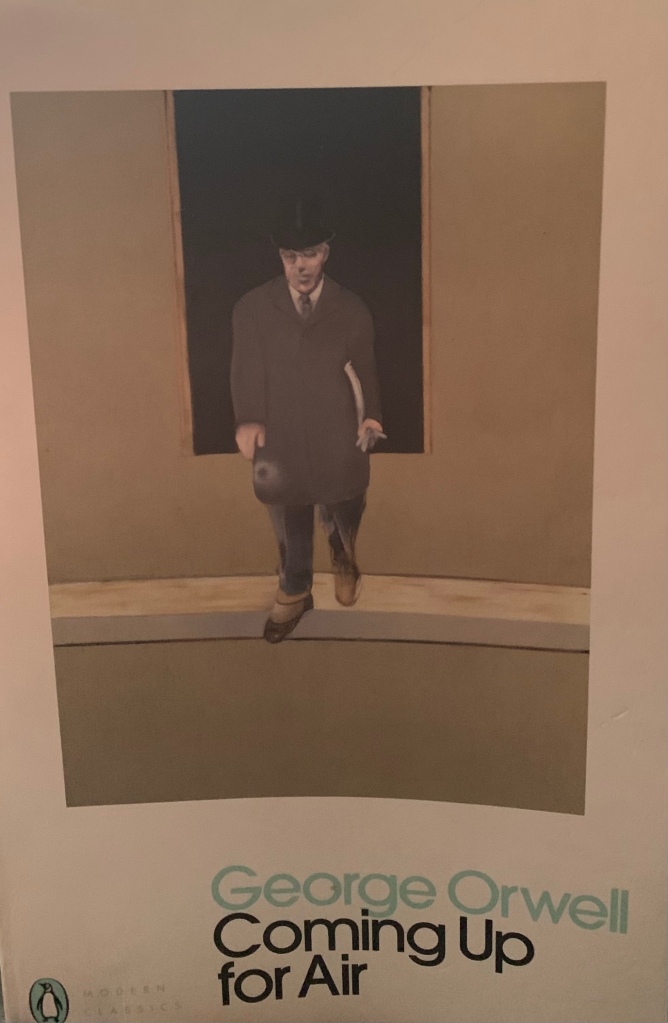“Bombs of filth bursting inside your mouth”: George Orwell’s Coming up for Air
by Mark Wallace
George Orwell’s literary career had, in retrospect, a perfect trajectory. He had a long struggle in which he lived meagrely, then wrote some well-received non-fiction volumes (Down and Out in Paris and London, The Road to Wigan Pier, Homage to Catalonia) while also experimenting, less successfully, with novel writing. When war hit, he began working with the Home Guard and his writing took on a patriotic bent. In 1941 he got a job in the BBC, finally putting him at the centre of national political and cultural conversations as well as improving his financial situation. He produced a stream of influential essays during the war years (including “My Country Right or Left”, “Politics and the English Language” and too many to mention) before finally returning to fiction and hitting the jackpot with Animal Farm and 1984. A few months after publication of 1984, he became too ill to write and, a few month after that, he died. In the last years of his life, everything turned to gold in his career: seminal non-fiction essays on culture and politics and two of the most influential novels of the century.
One of the forgotten Orwell novels is Coming up for Air, written during six months he spent in Morocco in 1938-39. It is a first-person narrative, very readable and very thin on plot, about George Bowling, a middle-aged, middle-class insurance salesman who feels the need to escape modern life and his family. It opens:
The idea really came to me the day I got my new false teeth.
I remember the morning well. At about a quarter to eight I’d nipped out of bed and got into the bathroom just in time to shut the kids out. It was a beastly January morning, with a dirty yellowish-grey sky.
Penguin 2020, p. 3
George’s false teeth are a recurring them in the opening pages. Orwell is precise on the discomfort caused by the absence of teeth:
It gives you a rotten feeling to have your gums meet, a sort of pinched-up, withered feeling like when you’ve bitten into a sour apple.
p. 4
It is typical of Orwell to choose to articulate this feeling of discomfort and unease, and to be able to do so vividly. Every moment of Bowling’s life seems attended by some minor physical discomfort or displeasure:
It’s a rotten thing to have a soapy neck. It gives you a disgusting sticky feeling, and the queer thing is that, however carefully you sponge it away, when you’ve once discovered that your neck is soapy you feel sticky for the rest of the day. I went downstairs in a bad temper and ready to make myself disagreeable.
p. 6
The prevalence of words like “rotten” and “beastly” in the opening chapter paint a picture of unremitting grimness found in many of Orwell’s books, including 1984, which opens on a “bright cold day”, with a “vile wind” in a hallway that “smelt of boiled cabbage and old rag mats.” In Coming Up For Air, the discomfort is not just incidental but symptomatic of modern life, as Bowling concludes when he eats a sausage that, as it turns out, is made of fish:
It gave me the feeling that I’d bitten into the modern world and discovered what it was really made of. That’s the way we’re going nowadays. Everything slick and streamlined, everything made out of something else. Celluloid, rubber, chromium-steel everywhere, arc-lamps blazing all night, glass roofs over your head, radios all playing the same tune, no vegetation left, everything cemented over, mock-turtles grazing under the neutral fruit-trees. But when you come down to brass tacks and get your teeth into something solid, a sausage for instance, that’s what you get. Rotten fish in a rubber skin. Bombs of filth bursting inside your mouth.
p. 26

It’s worse than that, though. Not only is the modern world inescapably disgusting, but Bowling (or Orwell) sees World War II coming with unflinching clarity. It reminds me of H.G. Wells’ In Search of Hot Water, another book written in 1938-39 suffused with the certainty that a terrible war was approaching. Which, of course, it was. In idle moments, Bowling’s mind turns to war:
My mind went back to the thoughts of war I’d been having earlier that morning, when the bomber flew over the train. I felt in a kind of prophetic mood, the mood in which you foresee the end of the world and get a certain kick out of it.
And this kind of prophetic feeling that keeps coming over me nowadays, the feeling that war’s just round the corner and that war’s the end of all things, isn’t peculiar to me.
I see it all. I see the posters and the food-queues, and the castor oil and the rubber truncheons and the machine-guns squirting out of bedroom windows.
pp. 28-29
It is no wonder that Bowling seeks refuge in a return to his childhood. He travels to the small town he grew up in, which he has not returned to in decades. Without giving too much away, he doesn’t find what he seeks. The past is gone and irrecoverable. He does reach a striking and resonant conclusion about why the past, with all its harshness and privations, was a far better place than the present of 1938-39:
[P]eople then had something that we haven’t got now.
What? It was simply that they didn’t think of the future as something to be terrified of. It isn’t that life was softer then than now. Actually it was harsher. People on the whole worked harder, lived less comfortably, and died more painfully.
p. 119

Orwell’s monumental pessimism feels relevant in the 21st century, not just in 1984 but in Coming up For Air. In the latter, the nightmare hasn’t quite arrived yet, but it is on the way and things are already bad enough. We, too, habitually envision a dark future, whether through environmental apocalypse, resource depletion, Europe at war – cold or hot – with its neighbours, famine and viral pestilence; or maybe through over-reaching corporate power co-opting democracy, aided by a regime of social credit and medical mandates. Perhaps the comfort of reading Orwell is realising that it has all been thought before. Cultural apocalyptism has always been with us. The end is always near. The Doomsday Clock is always inching closer to midnight. (If they keep pushing it forward to signal “unprecedented danger”, they may overshoot midnight and leave themselves no option but to inform us doomsday has already happened.) Reading Coming Up For Air, you might wonder what is to be missed about life anyway. An endless slog of bratty kids, termagant wives, soul-sucking jobs, encroaching wars and poor dental hygiene – that is all Orwell’s protagonist is offered and, by the end, even the possibility of escape has vanished.